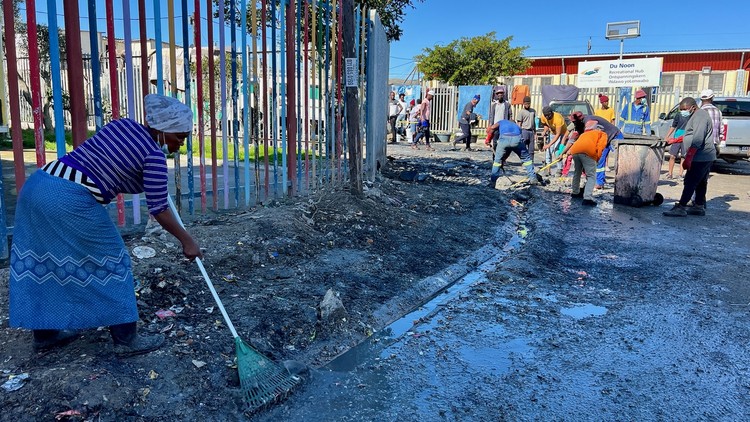
14 August 2023
Dunoon’s Ekuphumuleni informal settlement resident Nomathemba Makhoba was part of a group of about 20 women who on Women’s Day cleared garbage that had been piling up behind the communal toilets near the Dunoon library for the past month. Photo: Peter Luhanga.
Instead of celebrating Women’s Day this year the way she would have liked, Nosipho Dyonase spent last week’s public holiday with a group of about 20 women cleaning up mounds of garbage.
Since a contract for waste collection with the City of Cape Town expired on 30 June, rubbish has been piling up in Dunoon, much of it behind the communal toilets near the library. Two standpipes, supplying water for hundreds of families in Ekuphumuleni and Bekela informal settlements, were also affected by the stinking piles of rubbish.
The women, worried about the health risks of festering garbage, borrowed brooms, rakes, and shovels from the City’s storage facility to clean up.
“We thought we could make traditional meals such us umngqusho to celebrate Women’s Day, but were not able to because it is too filthy outside, so we resorted to cleaning our environment,” said Dyonase.
She lives with her husband and child in Bekela in a three-room shack.
Nomathemba Makhoba, from Ekuphumuleni informal settlement, who sells braaied offal for a living, said customers had stopped buying from her stand because of the stench. So she joined the clean-up.
“There are sanitary pads, faeces, dog carcasses. We are wearing masks but the smell is still so bad,” she said.
The women were supported by a group of about 40 men, the first of whom to join was 32-year-old Sigqibo Pini, from Ekuphumuleni.
Pini said he saw no men assisting the women, but when he started helping, more men joined him.
Earlier last week, residents marched to Blaauwberg municipal subcouncil offices to protest over the unsanitary state of Dunoon’s informal settlements.